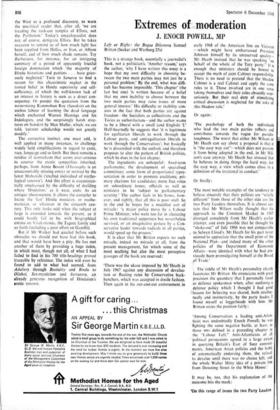Not this, not that
FRANCIS WATSON
The Brahman is One, but there are 330,000,003 deities. There are 88,000 chakras, or centres of psychic energy, in the human body (among which the anus provides the chakra of material success and aesthetic feeling). There are more than 330 Sanskrit synonyms for the word 'prostitute.' But in no indigenous Indian lan- guage will you find an equivalent of the term 'Hinduism.' You may seek its popular essence through the 24,000 stanzas of the Ramayana, the world's longest epic. Alternatively, you may accept its total statement in the Upanishadic neii-neti—'not this, not that.'
To dip into these two stout volumes, in short, is to understand why a reference work of this kind has not hitherto been attempted; and also, perhaps, to appreciate the method adopted for the present enterprise. Since no imaginable edi- torial committee could well have agreed upon formula and frontiers for the theme, and no imaginable panel of expert contributors have kept within them, the whole compilation is the work of a modestly self-confessed 'non- specialist': from Abhira Can immigrant, prob- ably non-Aryan tribe of ancient India') to Zoroastrianism (an equally mysterious and much more intellectual import), the 700 articles are Mr Walker's own work.
At the very least this is an impressive labour of recension from existing sources of know- ledge. Free to follow his own bent, Mr Walker boldly and often ably compresses philosophi- cal systems, branches of knowledge, even whole faiths such as Jainism and Buddhism, into a page or two, to spread himself on groups of ideas or practices (kingship, names, preg- nancy, sacrifice, warfare), on a key event of tradition like the battle of Kurukshetra, or to recover the vivid figures of history, myth, faith and folklore from a past in which such categorisation was happily 'disregarded. The, authorities cited at the end of each article, for the most part highly respectable, stimulate an occasional curiosity. I can hardly wait to dis- *over the contribution of the female vulva to The Struggle for Empire, one of the two work' acknowledged for the entry. under Yoni. •fi If a browser (and these volumes are i bFowse(s joy) is entitled to identify a tone, 11 catch at many points in Mr Walker's prodigious survey the echoes of a once prevalent belief In the need ta correct the excesses of Indo- Plailia. I recall a prized volume of Trubner's Orieiltal Series of 1882' in which an English Professor in Calcutta would pause, in expound- ing Upanishads which had *fornierbi the West as a profound discovery, to warn the uncritical reader that, after all, 'we are treading the rock-cut temples of Ellora, not the Parthenon.' Today's encyclopaedist does not, of course, denigrate Ellora. But he takes occasion to remind us of how much light has been supplied from Hellas, or Iran, or Albion herself, and of how much shade remains. Try Barbarians, for instance, for an intriguing summary of a period of apparently fruitful foreign domination which 'the majority of Hindu historians and patriots . . . have griev- ously neglected.' Turn to Sanatva to find a reason for this chauvinistic neglect in the rooted belief in Hindu superiority and self- sufficiency, of which the well-known lack of an interest in history is seen as a direct con- sequence. Or ponder the quotation from the westernising Rammohun Roy (Sanskrit) on the useless labour of learning the dead language which enchanted Warren Hastings and his Indologists, and the surprisingly harsh stric- tures on Sanskrit by Max Muller, which, we are told, 'current scholarship would not greatly modify.'
The corrective instinct, one must add, is well applied in many instances, to challenge widely held simplifications in regard to caste, race, language and so forth. But there remains a residue of iconoclasm that seems over-anxious to counter the exotic sympathies inherited, perhaps, from Annie Besant (Theosophy is.an unaccountably missing entry) or revived by the latest Maharishi ('exalted individual of mytho- logical renown'). And this effect is circumstan- tially emphasised by the difficulty of dectding where 'Hinduism,' as it were, ends. As an antique phenomenon, it allows the compiler to locate the 'last' Hindu musician, or mathe- matician, or whatever in the sixteenth cen- tury. This only looks odd when the subject at large is extended towards the present, as it could hardly fail to be, with biographical entries on Vivekananda, the Tagore family and so forth (including a poor effort on Gandhi).
But if Mr Walker had quailed before such obstacles we should not have had this book, and that would have been a pity. He has met another of them by providing a huge index, in which most, though not all, of what I had failed to find in his 700 title-headings proved traceable by reference. The index will even be found to add to what had seemed, from Adultery through Bestiality and Hindu to Olisboi, Sex-mysticism and Stritantra, an already generous recognition of Hinduism's erotic renown.



































 Previous page
Previous page